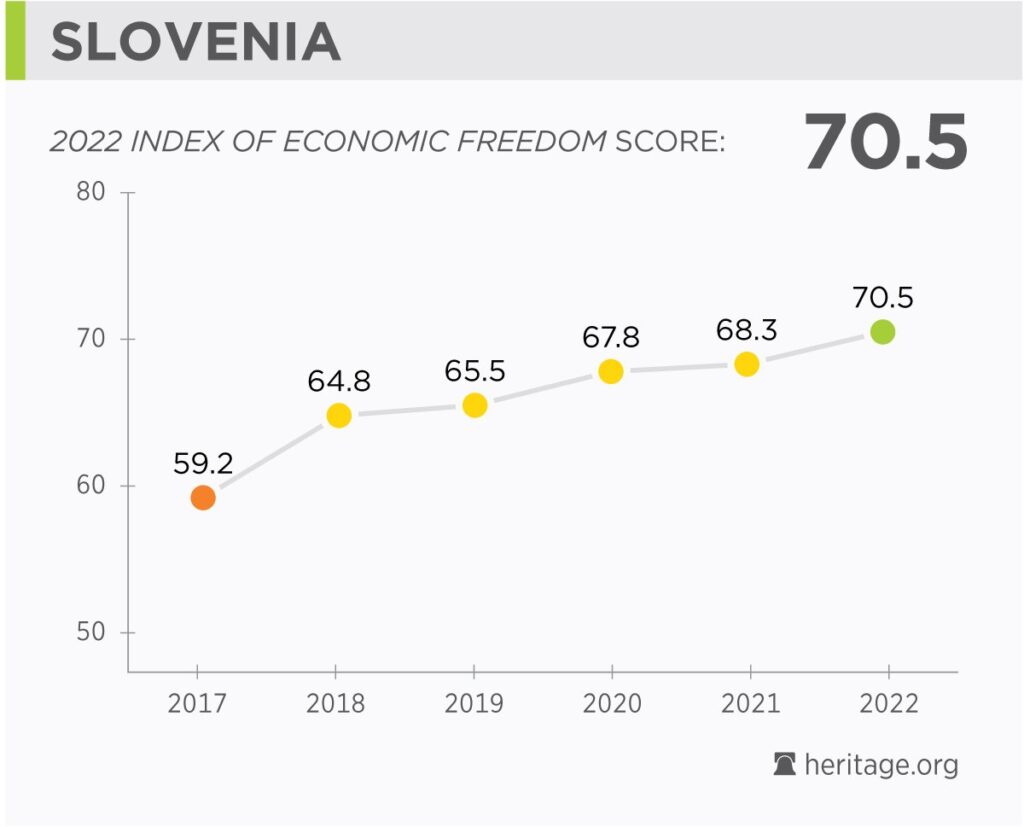The economic freedom of a country is essential for its economic growth and the well-being of its inhabitants, and Slovenia, according to the latest measurement of the Index of Economic Freedom, has reached its highest place ever, ranking in an enviable 32nd place among 177 countries. Despite the pandemic, which the whole world had to face, Slovenia has maintained a good average of economic freedom, which is something most of the other countries cannot say themselves.
The Index of Economic Freedom, which has been measured by the American Heritage Foundation since 1995, believes that the connection “between economic freedom and prosperity is one that shows what people are capable of if they are offered the maximum opportunity to pursue their interests within the rule of law,” stressing that economic freedom should not be taken for granted, as it can disappear in an instant.
Economic freedom is an indicator of the well-being of citizens
The essence of economic freedom is that it is the fundamental right of every human to control his or her own labour and property, which means that in an economically free society, individuals are free to work, produce, consume, and invest in any way they please, and the governments have to ensure that labour, capital and goods can move freely, and refrain from coercion or constraint of liberty beyond the extent necessary to protect and maintain liberty itself.
The American institution which measures economic freedom obtains its results on the basis of 12 quantitative and qualitative factors, which are grouped into four broad categories, or pillars, of economic freedom: the rule of law (property rights, government integrity, judicial effectiveness), government size (government spending, tax burden, fiscal health), regulatory efficiency (business freedom, labour freedom, monetary freedom), and open markets (trade freedom, investment freedom, financial freedom). Each of the twelve economic freedoms within these categories is graded on a scale of 0 to 100. A country’s overall score is derived by averaging these twelve economic freedoms, with equal weight being given to each.
Slovenia’s overall results are above the regional and world average
Among the 45 countries from the European region, Slovenia ranks 22nd according to the Index of Economic Freedom, and the fact that its overall result is above the regional and global average, is enviable. Led by notable increases in scores for fiscal health and the rule of law, Slovenia has recorded an impressive 11.3-point overall gain in economic freedom since 2017 and has climbed over the threshold into the “Mostly Free” category for the first time in the 28-year history of the Index. Monetary freedom is a high point, but government spending weighs heavily on the economy.
Slovenia is limited by high tax burdens
The rule of law in Slovenia is among the best-rated categories, in which the researchers assessed that the judiciary is independent but slow and inefficient, and they also highlighted the problem of corruption. Meanwhile, the general government sector was among the worst-rated categories, which landed there due to high tax burdens and high general government spending. The financial sector, which is dominated by banks, remains relatively stable. Nevertheless, Slovenia can be proud of its monetary freedom and low start-up costs, with only about 35 percent of companies still being owned or controlled by the state. However, the labour market remains under-dynamic due to barriers in letting employees go. According to the results of the research, the Slovenian market is relatively open, also to foreign investments, but not efficient enough.
Despite the pandemic, Slovenia is one of the rare few countries that has progressed
The average score of global economic freedom is 60 points, which is 1.6 points less than the year before. According to the Heritage Foundation, one of the main reasons for the decline is the pandemic of the novel coronavirus and the restrictive measures related to it. Due to restrictive measures, the economy in Slovenia shrank by 5.5 percent in 2020, and we ranked 35th in terms of the severity of government measures. Slovenia can therefore be proud of its monetary freedom, but there is lots of room for improvement in terms of government spending. In any case, we can conclude with the statement that Slovenia performed great, as it even progressed during a crisis period, which is something not many countries can say.
Tanja Brkić


